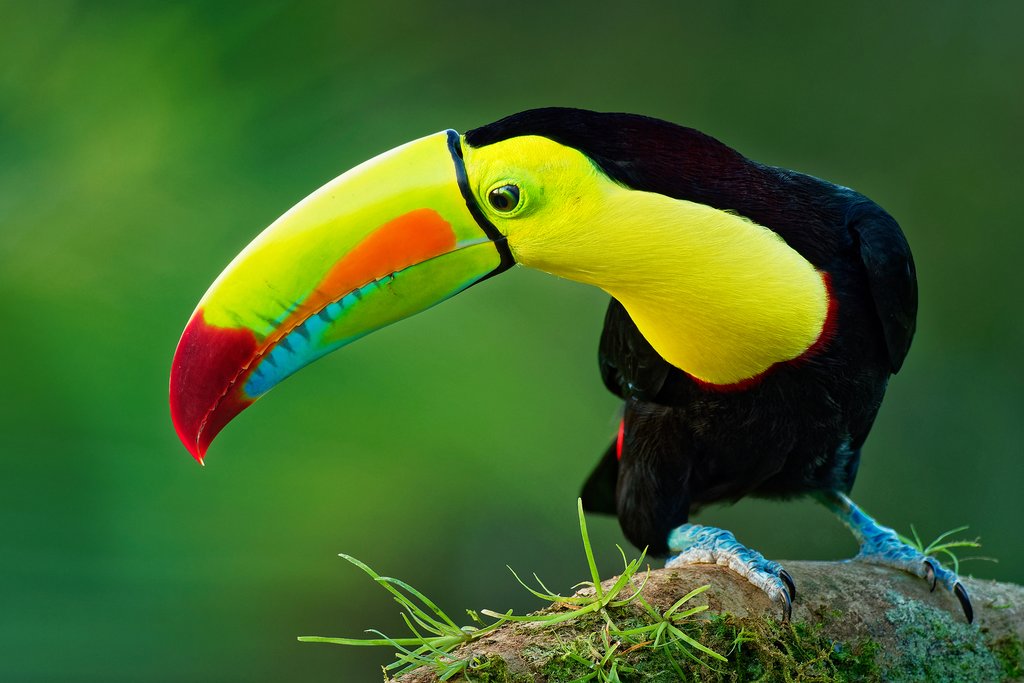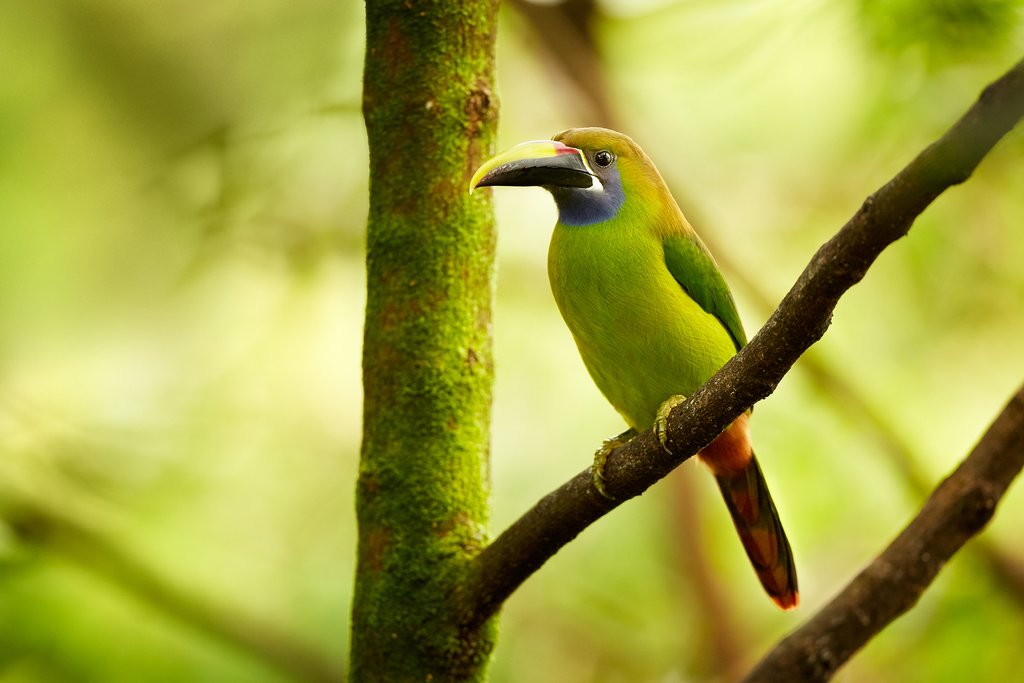Highlights
- Hike along rainforest trails and view exotic bird species like macaws and toucans
- Go on early-morning birding adventures to see exotic birds at their most active
- Visit world-famous biological research stations that study tropical ecosystems
- View the elusive resplendent quetzal in its natural habitat
Brief Itinerary
| Day | Highlights | Overnight |
|---|---|---|
| Day 1 | Arrival in Costa Rica – Experience San José's Culture | San Jose |
| Day 2 | Transfer From San José to Boca Tapada | Boca Tapada |
| Day 3 | Birding at Boca Tapada | Boca Tapada |
| Day 4 | Drive from Boca Tapada to Sarapiquí | Sarapiquí |
| Day 5 | Birding at a Biological Research Station | Sarapiquí |
| Day 6 | Morning Birding - Transfer to the Turrialba Valley | Turrialba |
| Day 7 | Morning Birding at Turrialba | Turrialba |
| Day 8 | Drive to the Talamanca Mountains | San Gerardo de Dota |
| Day 9 | Transfer to San José - Departure |
Detailed Itinerary
Day 1: Arrival in Costa Rica – Experience San José's Culture

Welcome to Costa Rica, the land of pura vida! After arriving at Juan Santamaría International Airport in San José, a local representative will meet you and escort you to your hotel. The rest of the day you'll have free to explore the city at your leisure.
Perhaps stroll through Mercado Central (Central Market), which features over 200 shops and food stalls. Then visit the Catedral Metropolitana (Metropolitan Church), whose interior combines Greek Orthodox, neoclassical, and Baroque styles. There's also the neo-classical National Theater and the Museo del Jade, which houses the world's largest collection of pre-Columbian jade artifacts.
Be sure to explore Barrio Amón, a bohemian neighborhood home to historic cafetalero (coffee grower) mansions built during the late 19th and early 20th centuries. For dinner, opt for a restaurant in the hills of Escazú. This elevated region on the western edge of the city offers panoramic views of the valley below. That said, San José is filled with great restaurants serving everything from traditional Costa Rican fare to forward-thinking fusion cuisine.
Day 2: Transfer From San José to Boca Tapada

Wake up and enjoy breakfast at your hotel. You'll then hop in your rental car and begin the drive north towards the Nicaraguan border. This is a scenic trip that passes by the rainforest-covered mountains of the Central Valley before reaching Costa Rica's northern plains.
When lunchtime rolls around, do like the locals and pull off at one of the many roadside "sodas." These family-run eateries are the life-blood of the country and serve delicious homemade fare. Typical options include the casado, a combo plate featuring rice, beans, and your choice of chicken, beef, pork, or fish.
Your drive continues to the Boca Tapada region, situated on the San Carlos River just a few kilometers south of the Nicaraguan border. This bucolic area is far off the tourist trail and offers secluded nature and a number of excursions, such as boat rides on the river and, of course, great birding.
You'll be staying at a local eco-lodge in the rainforest that sits on almost 150 acres and is home to over 410 bird species. This makes for ideal conditions for nature photography, and it's the perfect spot for a birding excursion. There are even bird feeders in the gardens around the lodge, so you don't have to travel far to view some of the most exotic species.
Day 3: Birding at Boca Tapada

Today's birding adventure starts early, at 5:30 am, when most of the birds in the area are waking up and beginning their daily routine. Along with a naturalist guide, you'll hike through the rainforest in search of both native and migratory species. Types of birds you can spot include the green macaw, scarlet macaw, toucans, oropendolas, honeycreepers, tanagers, euphonias, and jacamars.
You'll return to your ecolodge at 7:30 am to enjoy a delicious breakfast. As a bonus, you'll be able to see hummingbirds, woodpeckers, parrots, and toucans, fluttering right near the restaurant terrace as you eat. Next up is a brisk rainforest hike in which a knowledgable local guide reveals even more secrets about the jungle. Afterward, if you still have the energy, you can opt for an afternoon boat ride on the San Carlos River to observe more wildlife while floating down to the Nicaraguan border.
Chat with a local specialist who can help organize your trip.
Day 4: Drive from Boca Tapada to Sarapiquí

In the morning you'll embark on a 1.5-hour drive east to the Sarapiqui region. It is known throughout Costa Rica for its rich biodiversity and thus is a prime destination for nature seekers. Upon arrival in town, you'll continue a short distance to your hotel and check-in. After that, you will have the afternoon at leisure to explore the surroundings. If you're up for some wildlife spotting, there are a number of sites within easy hiking distance.
At the La Tirimbina Rainforest Center, you can enjoy a self-guided hike along the nature trails within this 850-acre biological reserve. Their five miles of hiking trails pass through mid-elevation premontane forest and include hiking on suspension bridges that cross over the Sarapiquí River. A walk here is filled with unique rainforest vegetation as well as different species of wildlife and exotic birds.
Later you can opt for a visit to Selva Verde, a lodge nestled within a 500-acre private reserve. In the evening, you'll have the option to join one of Selva Verde's on-site naturalists for a nocturnal nature tour, and they will point out exotic species like tree frogs, stick insects, kinkajous, bats, and spiders.
Day 5: Birding at a Biological Research Station

Today you'll arrive at a rainforest biological station that is one of the world's most important sites for tropical ecosystem research. Each year, more than 250 scientists from 25 countries and thousands of international students come here to study tropical ecology. Major research projects focus on forest dynamics, biodiversity, nutrient cycling, carbon sequestering, and native species reforestation.
It's also one of the finest birdwatching locales in all of Costa Rica. Its excellent network of hiking trails run through a variety of habitats, from dense primary rainforest to open pastures and valleys. Birdwatching tours begin at 5:45 am and last approximately two hours. Some species that you can see include various herons, the bare-necked umbrellabird, red-capped manakin, and the rufous-tailed jacamar.
In the afternoon, you can enjoy the exotic scenery and abundant wildlife in the region on an optional horseback tour. Thrill-seekers can experience more adrenaline-fuelled activities such as whitewater rafting and zip-line canopy tours.
Day 6: Morning Birding - Transfer to the Turrialba Valley

Another fantastic day is in store as you awake early for a drive to La Tirimbina Rainforest Center for a morning birdwatching tour. Over the course of 2.5 hours, a local English-speaking guide will share their knowledge about the region and its wildlife as you hike along the river to primary and secondary forests in search of different species. Some of the birds you'll see are tanagers, honeycreepers, and herons. Other rare species include the sunbittern, snowy cotinga, collared aracari, and black-crested coquette.
Afterward, you'll return the hotel for breakfast and then embark on a three-hour drive to Turrialba. Conveniently located between San José and the Caribbean coast, this region is known for its green rolling hills and volcano of the same name. Turrialba´s rich volcanic soil is ideal for the growth of coffee, sugar cane, macadamia, and other crops. It's also famous for cheesemaking and open-air fruit and vegetable markets that offer some of the best produce in Costa Rica.
Your destination in Turrialba is a family-owned lodge on a 140-acre reserve. The main building is done in the Spanish-colonial style, and there's a large indoor/outdoor dining area offering great birding vantage points while you eat. The lodge also features a premier birding viewpoint upstairs in the ranch's main building.
Day 7: Morning Birding at Turrialba

The area around the lodge is home to many resident and migratory birds. Over 430 species have been recorded in this region, and today you can choose between four different birding tours accompanied by freelance English-speaking guides. The options include:
-
La Mina. This local birding spot is adjacent to a river and offers probably the best chance in Costa Rica to spot the elusive sunbittern. Other exotic river birds you can see here include the torrent tyrannulet, American dipper, migrant waterthrushes and the occasional tanager.
Duration: 2+ Hours / Distance: 20 minutes from Rancho
-
Río Tuis Valley. There's a hiking trail leading into the Zona Protectora Rio Tui, a vast forest reserve that takes up over 100,000 acres, and the birding is excellent all along it. Here there are flocks of tanagers and a variety of raptors while at higher altitudes you can see azure-hooded jays. It's also the most reliable locale in the country to spot the enigmatic lanceolated monklet.
Duration: 2+ Hours / Distance: 20 minutes or less from Rancho Naturalista
-
C.A.T.I.E. The Centro Agronómico Tropical de Investigación y Enseñanza (C.A.T.I.E) offers a chance to see birds you won’t otherwise see at the ranch. These include aquatic birds like boat-billed herons and purple gallinules. Keep an out for green ibises feeding in the open on the grassy grounds. The wide-open setting here is also great for photography.
Duration: 2+ Hours / Distance: 30 minutes from Rancho Naturalista
-
Base of Cerro Silencio. The base of Cerro Silencio mountain offers great birding including opportunities to see tanagers, red-fronted parrotlets, hawk-eagles and a host of other birds that thrive at higher altitudes. If you want to hike all the way up the mountain, it takes a full day.
Duration: 2+ Hours / Distance: 30 minutes or so from Rancho
Day 8: Drive to the Talamanca Mountains

In the morning you'll continue your adventure with a 3.5-hour drive from Turrialba deep into the heart of the Talamanca Mountains and the community of San Gerardo de Dota. You can stop along the way for an optional visit to the highest active volcano in Costa Rica, the Irazu Volcano (11,259 feet3,432 meters). On this break from the road, you'll stroll the various hiking trails and can peer into the volcano's three volcanic craters. One of them even has an impressive turquoise lagoon in it.
Afterward, you'll continue the drive southeast of San José to the city of Cartago, where you can visit the most famous church in the country, the Nuestra Señora de los Ángeles Basilica, and In the late afternoon, you'll reach San Gerardo de Dota. Enjoy the cool mist in this high-altitude valley surrounded by cloud forests brimming with oak trees. It's this unique forest that's the habitat of one of the most beautiful birds in the world, the resplendent quetzal.
After checking into your mountain hotel, you can spend the rest of the day relaxing. The hotel is remote, so we recommend enjoying dinner at its stellar restaurant. Be sure to sleep well and save energy because tomorrow we will look for the resplendent quetzal.
Day 9: Transfer to San José - Departure

After enjoying a leisurely breakfast at your hotel, you'll make the drive back to San José and Juan Santamaría International Airport. You'll then drop off your vehicle at the car rental service and transfer to the terminal to catch your flight home. We wish you a safe flight and hope to greet in Costa Rica again soon. Hasta luego and pura vida!


